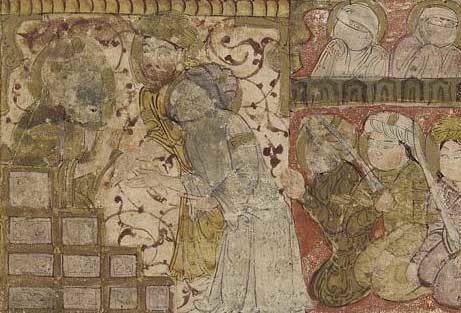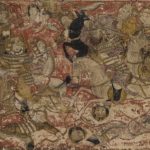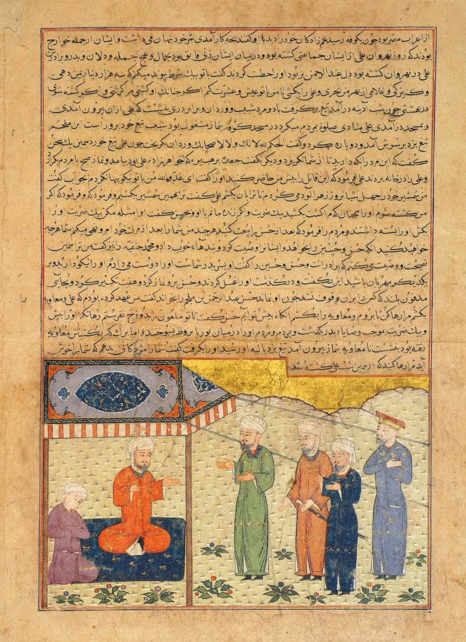
As for the relationship of affection between Abu Bakr and a number of senior Companions, this was embodied in their refusal to pledge allegiance to him after Saqifa and these were, according to the history books, ‘Alī ibn Abī Ṭālib, the people of the Banī Hāshim, al-Zubayr ibn al-‘Awwām, Khālid ibn Sa‘īd ibn al-‘Āṣ al-Umawī, Sa‘d ibn ‘Ubāda al-Anṣārī, Ṭalḥa ibn ‘Ubayd Allāh, al-Miqdād ibn al-Aswad, Salmān al-Fārisī, al-Barā’ ibn ‘Āzib and Abī ibn Ka‘b.
IN HIS COLLECTION of Ṣaḥīḥ hadiths Muslim narrates a tale that demonstrates the position of ‘Alī ibn Abī Ṭālib as regards Abū Bakr and ‘Umar. In this account ‘Umar addresses ‘Alī ibn Abī Ṭālib concerning his attitude towards Abū Bakr: “You saw him as a liar, a sinner, a traitor”. This indicates that ’Alī’s position on Abū Bakr was negative, and that he saw him as a treacherous sinner and a traitor. The rest of the account has ‘Umar ibn al-Khaṭṭāb describing the position of the Imam towards him:
Then Abū Bakr died and even though I was the close friend of the Messenger of Allah and and of Abū Bakr, you saw me as a liar, a sinner, a traitor. [1]
Turning to the relationship between ‘Alī ibn Abī Ṭālib, and ‘Uthman ibn ‘Affān, Al-Ḥāfiẓ Aḥmad ibn ‘Alī ibn Ḥajar al-‘Asqilānī mentions in his work Al-Maṭālib al-‘Aliyya[2] that Isḥāq ibn Rāhawayh in his Musnad related the following:
Al-Mu‘tamar ibn Sulaymān said: “I heard my father say that Abū Naḍra told us, from Abū Sa‘īd Mawlā Abī Usayd – who is Mālik ibn Rabī‘a – how ‘Uthman ibn ‘Affān, was prevented from performing the ‘Umra during the months of Ḥajj or from celebrating the ‘Umra before the Ḥajj. so ‘Ali performed it in his place. Whereupon ‘Uthmān came down from the pulpit, took up something and brought it over to ‘Alī. Ṭalḥan and al-Zubayr then got up and snatched it from him and walked over to ‘Alī and almost poked his eye with his finger saying: “You are entirely wrong!” To which ‘Alī gave no response.
As for the intimate relationship between Imām ‘Alī ibn Abī Ṭālib and the rest of the Companions, Ibn Taymiyya gives an account of this in his work Minhāj al-Sunna: [3]
Fourthly: God has instructed that He will look kindly on those who believe and do good deeds. This is a sincere promise from Him, and it is known that God has placed affection for the Companions in the heart of every Muslim, especially the Caliphs (may Allah be pleased with them) and of these especially Abū Bakr and ‘Umar. The generality of the Companions and followers held them in great affection, and these were the best of eras. But this was not the case with ‘Alī, for many of the Companions and the Followers hated him, insulted him and fought against him.
The affection between the Banū Hāshim and the rest of the clans of the Quraysh was also a reason for Al-‘Abbās ibn ‘Abd al-Muṭṭalib thanking the Prophet, as was mentioned in the work Al-Jāmi‘ al-Ṣaḥīḥ known as Sunan al-Tirmidhī:[4]
Al-‘Abbās ibn ‘Abd al-Muṭṭalib entered upon the Messenger of Allah in a state of anger while I was with him, so he said: ‘What has angered you?’ He said: ‘O Messenger of Allah, what is it with us and the Quraysh, whenever they meet one another it is with glad faces, and when they meet us they meet us with other than that?'” He said: “So the Messenger of Allah became angry, until his face reddened, then he said: ‘By the One in Whose Hand is my soul! Faith does not enter a man’s heart until he loves you for the sake of Allah, and for the sake of His Messenger.’ Then he said: ‘O people! Whoever harms my uncle, he has harmed me, for indeed, a man’s uncle is from the same stem of his father.
Al-Tirmidhī classified this hadith as ḥasan, ṣaḥīḥ,[5] and Ibn al-Athīr records this same hadith in his work Asad al-Ghāba fī Ma‘rifat al-Ṣaḥāba.[6]
So much for the four great Companions. Let us now take a look at the relationship of the rest of the Companions with each other, and I repeat here that the source for this are the reliable works of the Ahl al-Sunna wal-Jamā‘a. [7]
If we look in those sources at the relationship between ‘Ā’isha bint Abī Bakr, the wife of the Prophet, and his cousin ‘Aī ibn Abī Ṭālib, we find Ibn Sa’d narrating in his work Al-Ṭabaqāt al-Kubrā [8], as well as Ibn Al-Athīr in his Al-Kāmil fī al-Tārīkh [9] as well as Al-Balādhurī and Miskawayh al-Rāzī in his History:
When news came to ‘Ā’isha that ‘Alī had been killed, she said in verse:
She cast away her staff and pondered into the distance – as the eyes of the wayfarer are fixed on his home.
“Who killed him?” she asked, “A man from Murād” to which she replied:
Though he be far removed, we mourn him – a child whose face the earth never touches.
Then Zaynab, the daughter of Abu Salama, said, “Are you referring to ‘Alī? She replied: “I am prone to forget things, but if I forget him, then be sure to recall him again to me.” The one who attended his mourning was Sufyān ibn ‘Abd Shams ibn Abī Waqqāṣ al-Zuhrī, and this shows the extent to which the wife of the Prophet loved ‘Aī ibn Abī Ṭālib even after he was killed.
As for the relationship of the Companions and their love for ‘Uthman ibn ‘Affān, this was embodied in ‘Uthmān’s breaking the ribs of the Companion ‘Abdullah ibn Mas‘ūd, as a result of which the man died. ‘Uthman also struck ‘Ammār ibn Yāsir until his stomach suffered a hernia and he lost consciousness. ‘Uthman went on to exile some of the Companions and was so enraged against them that some of them died in exile alone and in poverty, such as the great Companion Abū Dharr al-Ghafārī. Ibn Sa‘d recorded the following in his Ṭabaqāt:
‘Affān ibn Muslim relates that Ḥammād ibn Salama said: “Abu Ḥafṣ and Kulthūm ibn Jabr told us how Abū Ghādiya related that he heard ‘Ammār ibn Yāsir cursing ‘Uthmān in Madīna who said: “I promise to kill him!” To which I said: “May Allah enable me to do it for you!” At the Battle of Ṣiffīn, ‘Ammār was being borne aloft by the people. Someone said: “Here is Ammār!” I saw how there was a gap in armour between his lungs and his legs.. So I lunged at him and stabbed him in the knee. He then stumbled and I slew him.[10]
Ibn ‘Abd al-Birr writes in the work Al-Istī‘āb fī Ma ‘rifat al-Aṣḥāb:
Concerning the oath and loyalty between the Banī Makhzūm and between ‘Ammār and his father Yāsir, a meeting took place between the Banī Makhzūm and ‘Uthmān when some servant-boys of ‘Uthman had beaten ‘Ammār until he suffered a hernia in his abdomen and broke one of his ribs. The Banī Makhzūm met with him and said: “By God, if he died, we would have killed anyone other than ‘Uthmān!” [11]
The same was also recorded in al-Balādhurī’s Ansāb al-Ashrāf. And in Ibn Shabba’s History of Madīna the author writes that:
Ḥibbān ibn Bishr related that Jarīr ibn ‘Abd al-Ḥamīd told us how al-Mughīra had said: “Several people, including Ibn Mas‘ūd, collected together and wrote of the deficiencies of ‘Uthmān. They gathered at ‘Uthmān’s door to speak with him, but when they reached the door they flinched, with the exception of ‘Ammār ibn Yāsir who entered and lectured to him. Uthmān ordered him to be beaten, and he suffered a hernia and was unable to contain his bladder.
‘Ammār was later asked: “What is this all about?” He said: “I met some of the Quraysh in Islam like this, and they did such and such to me, and then I went into him – meaning ‘Uthman – and tasked him what should be commanded and what should be prohibited, and he did to me what you see, so that I could not contain my bladder”. And when he was beaten a man from Quraysh fell upon him and said, “But by Allah, if this man had died, they would have killed the pillar of the Quraysh!” He was the grandfather of Hishām ibn ‘Abd al-Malik. [12]
When news came of Abū Dharr’s death, ‘Uthmān said: “May God have mercy upon him!” ‘Ammār ibn Yāsir then said sarcastically to ‘Uthmān: “Yes, may God have mercy on him from all of us!” ‘Uthmān then replied: “Do you see me regretting doing this?[13]
Evidence of the relationship of affection between the Companions can be seen in the opinion of ‘Abd al-Raḥmān ibn ‘Awf on ‘Uthmān after his caliphate. Al-Balādhurī in his Ansāb al-Ashrāf [14] records that:
Muḥammad ibn Sa‘d told me, from al-Wāqidī, from Ibrāhīm ibn Sa‘d, from his father, that when Abu Dharr died in Rabdha, ‘Alī and ‘Abd al-Raḥmān ibn ‘Awf recalled that this was the act of ‘Uthmān. ‘Alī said, “This is your work” while ‘Abd al-Raḥmān said, “If you wish, take up your sword and I’ll take mine, for he has violated what he has given me.”
On the same page al-Balādhurī continues:
Muḥammad ibn Sa‘d told me, from al-Wāqidī, from Muḥammad ibn Ṣāliḥ, from ‘Ubayd ibn Rāfi‘ from ‘Uthmān ibn al-Shurayd, who said: ‘Abd al-Raḥmān ibn ‘Awf cited ‘Uthmān’s name during his illness from which he died, and he said: “Hurry, before he commits acts of rebellion in his ruling!” ‘Uthmān came to know of this and commanded that the well from which ‘Abd al-Raḥmān ibn ‘Awf drew his water was to be forbidden to him. At which ‘Abd al-Raḥmān said: ‘O God make its water hollow, for I did not find a drop in it.”
The same source also contains the following:
Muḥammad ibn Sa‘d told me, from al-Wāqidī, from Muḥammad ibn ‘Abdallah, from his father, from ‘Abdallah ibn Tha’laba ibn Ṣa‘īr, that “‘Abd al-Raḥmān ibn ‘Awf swore never to speak to ‘Uthmān”. Muṣ‘ab ibn ‘Abdallah al-Zubayrī also relates, from Ibrāhīm ibn Sa‘d, from his father, that ‘Abd al-Raḥmān also advised ‘Uthmān not to pray for him, and it was al-Zubayr or Sa d ibn Abī Waqqāṣ who prayed for him instead.

Suggested Reading
Al-Bāqillānī writes how ‘Ammār used to declare that “’Uthmān is a disbeliever” and that after the assassination of ‘Uthman said: “the day we killed ‘Uthmān we killed him as a disbeliever.” Naṣr ibn Muzāḥim narrates that Jundub ibn ‘Abdallah told how: ‘Ammar ibn Yasir stood up at the battle of Ṣiffīn and said: “Come with me, O servants of Allah, against a people who claim to seek revenge for the blood of the oppressor, one who ruled over the servants of Allah in ways other than what is stated in the Book of Allah. Nay but he was killed by righteous folk who deplored aggression, and who commanded good deeds, those who cared not for their safety in this mundane life below.”
From the foregoing, we may judge the quality of the relationship between the Companions: they fought each other, cursed each other, declared each other to be infidel and burned each other’s houses as the greatest expression of the compassion and affection that prevailed between them.
[1] The same hadith was narrated by ‘Abd al-Razzāq al-Ṣan‘ānī in his Muṣannaf, Vol. 5, pp.104-105, hadith no. 10532.
[2] المطالب العالية في زوائد المسانيد الثمانية Vol. 10, p. 44, Hadith No. 2136, ed. Abdullah ibn Muḥammad ibn Sa‘īd al-Shahrānī.
[3] Minhāj al-Sunna, vol. 7, pp137-138.
[4] Sunan al-Tirmidhī Hadith 3758.
[5] See Glossary: ‘Hadith’.
[6] Ibn al-Athīr, اسد الغابة في معرفة الصحابة ed. Dar Ibn Hazm, 2012, p.633.
[7] See Glossary: ‘Ahl al-Sunna wal-Jamā‘a’.
[8] Al-Ṭabaqāt al-Kubrā, ed. Dr. Manī‘ Muḥammad ‘Umar, Al-Khānjī Library, Cairo, Part III, p.38.
[9] Al-Kāmil fī al-Tārīkh ed. Abu Al-Fidā’ ‘Abdullah al-Qāḍī, Dār Al-Kutub al-‘Ilmiyya in Beirut Part III, p.259.
[10] Al-Ṭabaqāt al-Kubrā, ed. Dr. Manī‘ Muḥammad ‘Umar, vol. 3, p. 241.
[11] الاستيعاب في معرفة الاصحاب ed. Muḥammad ‘Alī al-Bajāwī, p.1136
[12] Ibn Shabba, تاريخ المدينة Part III, p.1099.
[13] Ansāb al-Ashrāf, part 5.
[14] Ansāb al-Ashrāf, Part 6, edd. Dr. Suhail Zakkar and Dr. Riad Zarkali, Office of Research and Studies, Dar al-Fikr pp.171-172.
Main image: The election of ‘Uthmān as caliph at Madina. Detail from a folio of the Tarikhnama by Bal’ami, early 14th century.
See Part One of this essay here

